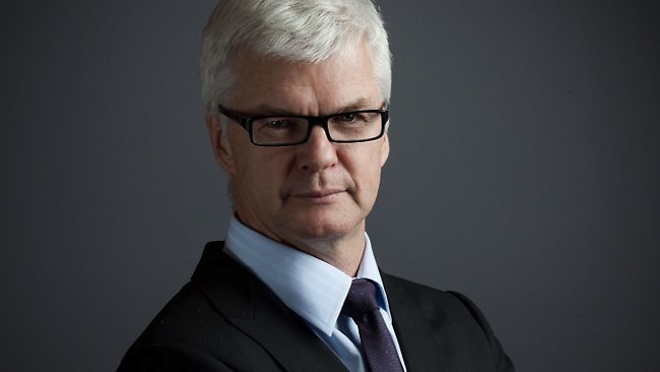Collapsed Equititrust boss returning to the law ... Money lending - Gold Coast style ... Negligence and breach of duties by Indians, not the Chiefs ... Lawyers know best ... Barry Lane reports
 Mark McIvor: champion of retirees savings
Mark McIvor: champion of retirees savings
AT first blush it might be thought that Ben Polis and Mark McIvor don't have much in common.
True it is, they are both suffering from the crushing ignominy and material loss of corporate failure - Ben coming unstuck with the collapse of his Energy Watch empire and Mark being tossed out of Equititrust, the Gold Coast moneylender he established and managed for over a decade.
Ben's business model didn't look like it was sustainable over the long term. The basis of his operation was to churn customers of electricity and gas suppliers for a commission from those companies.
I suppose it could have been sustainable if he was able to get the same mugs to come back time after time, but that was probably unlikely. Ben's company didn't have a product or service, as such, to sell.
If you wish to learn more about Ben's business "model" and how it got him into trouble check out Federal Court decisions here and here.
On the other hand, Mark's Equititrust did have some prospect of continuity. Although it was born as a solicitors' mortgage investment company, it was a moneylender at heart and from the dawn of time commerce has required the services of moneylenders and will continue to do so.
Mark's problem was that he raised the money he lent from mums and dads who, not unreasonably, wanted interest paid regularly and their principal returned when required.
Unfortunately, he lent it to people who couldn't or wouldn't pay it back.
Where both Ben and Mark are in lockstep however, is who was to blame for their undoing.
In Ben's case it was: "incompetent managers, an incredibly incompetent bookkeeper and lazy staff."
While for Mark it was: "gross mismanagement and negligence" of "two former Equititrust employees" and "routine breaches of fiduciary duty" by major law firms.
Mark also gave ASIC, Equititrust's auditor and the Commonwealth Bank a serve.
Nowhere mentioned by either tyro in the responsibility department was the perpendicular pronoun, as Sir Humphrey Appleby called it.
One of Mark's substantial clients was Queensland property developer Dudley "King Con" Quinlivan.
On June 13 last year, Colin Kruger from the Sydney Morning Herald wrote that it was nearly a decade since Quinlivan, a twice bankrupted former plumber ...
"was described as the 'King Con of Queensland' in the state's parliament over allegations his real estate empire was based on 'marketeering', a high-pressure sales tactic involving the marketing of Gold Coast properties to mum-and-dad investors. In 2008, the Australian Securities and Investments Commission banned Quinlivan from being a company director for three years relating to the collapse of 14 associated companies that were wound-up in insolvency between 2002 and 2007. Another three collapsed during the proceedings ASIC launched to ban him.
It did not stop Equititrust from increasing its lending to him the following year to $63 million."
When Quinlivan first appeared before the Commonwealth AAT in 2008, it was noted:
"Mr Quinlivan has been involved in the management of a number of companies that became insolvent. Those companies were wound-up leaving debts in the amount of $40 million. None of the unsecured creditors was paid a dividend. The liquidator lodged an adverse report pursuant to s 533 of the Corporations Act 2001. ASIC formally notified the applicant of its concerns on 11 August 2008. A hearing was held on 7 November 2008. Following the hearing, a delegate decided that Mr Quinlivan should be disqualified under s 206F for a period of three years. The decision was made on 21 November 2008. Notice of the decision was served on the applicant on 26 November 2008."
King Con's commercial failures between 2002 and 2007 were detailed by the Commonwealth AAT in 2010 when he was disqualified from being a manager of a company for five years.
In that decision the AAT found that Quinlivan has been the director of a large number of companies, many of which met with an unfortunate end.
Five of them were wound up in insolvency in the 1990s and 14 were wound up in insolvency between 2002 and 2007.
Another three companies have been placed in external administration since the commencement of the AAT proceedings.
The Commissioner of Taxation was the principal external creditor in most of those cases and received no dividend following the liquidations. The liquidators in each case filed reports recording the shortfall. The reports also referred to breaches of the law in each case.
 Dudley's digs at Southport
Dudley's digs at Southport
Quinlivan also experienced difficulties with his personal finances. His assets were sequestrated by a court order in 1981, he entered into an arrangement under Part X of the Bankruptcy Act 1966 in 1992 and a further sequestration order was made in 1994.
The AAT said:
"Mr Quinlivan appears to have limited insight into the causes of his failures in business. We were not satisfied he understood the extent to which his own shortcomings as a director and manager contributed to what occurred. In his evidence, he cast himself as the victim of unanticipated external events and forces. But in each case we have found those factors were either exaggerated, or their impact was exacerbated by his own shortcomings and misjudgements."
Then there was the evidence of Mark McIvor from Equititrust, which was Quinlivan's principal financier.
At the time of the hearing, the group companies owed around $63 million to Equititrust.
Unsuccessful efforts had been made to obtain alternative sources of finance at lower interest than that offered by Equititrust.
"If that refinancing does not occur in a timely way and the Quinlivan group subsequently collapses, Equititrust would be exposed to potentially significant losses ... Mr McIvor said that Mr Quinlivan's disqualification would make the group less attractive as a financing proposition. It would also constitute an event of default although there is no guarantee that the financiers would act against the group in those circumstances.
Mr McIvor agreed the success of the current development projects was very important to Equititrust. He said that success would be much harder to achieve in the absence of Mr Quinlivan's special skills in property development. He said the evidence he had heard about Mr Quinlivan's chequered business history did not change his mind about the desirability of retaining Mr Quinlivan in a management role at the Quinlivan group."
The tribunal accepted McIvor's evidence that the failure of companies in the Quinlivan group would have serious ramifications for the group's financiers. That might in turn have serious implications for those who deposited funds with the financiers.
"While we have expressed our concerns about [Quinvivan's] management skills, it appears his skills in the development and marketing of property are highly regarded. We accept it would be difficult to replace him in a timely way."
Nonetheless, it put Quinlivan off the track for five years. An appeal from that decision was dismissed by the Full Court of the Federal Court on December 23, 2010.
In the acceptance of responsibility department, it appears that Ben Polis, Mark McIvor and Dudley Quinlivan had taken their cue from a classic Fawlty Towers skit, where Manuel is persuaded to declare "I know nothing" in relation to Basil's successful punt on Dragonfly.
There's a disturbing finale.
The Sydney Morning Herald last month quoted McIvor as saying:
"I am returning to the practise of law, and incorporating a multi-discipline law firm to ensure that substantial investor, shareholder and creditor rights are protected," said McIvor. "Aged Australians have been disrespected and their life savings lost."
At least half the $200 million invested in the Equititrust Income Fund was lost by investors.
Most of the $70 million lent to developer Dudley (King Con) Quinlivan was lost.
Some of the content of that article came from a submission that McIvor made to a Senate committee inquiring into the post-GFC banking sector.
A fuller version of his rant is available here.
In regard to McIvor returning to legal practice, some comments in an affidavit filed in a Queensland Supreme Court case by a former director of Equititrust, Brisbane lawyer David Tucker, may be apposite:
"McIvor is not a fit and proper person to conduct, or in any way be involved in, let alone be in control of, the winding up of the Equititrust Income Fund ... He does not appreciate his statutory duties or what is in the best interest of investors. Nor is he committed to a proper and orderly winding up of the funds."
One hopes that the lawyer registration bodies in Queensland and New South Wales are taking note of all of this given that, in McIvor's own words, he considered that he had "the privilege of understanding the sanctity of the fiduciary relationship" notwithstanding his disastrous lending to Quinlivan, when it should have been apparent to any half competent lawyer that a commercial cowboy like King Con was a totally inappropriate person to whom Equititrust should be lending millions of dollars.
Creditors of the now thrice bankrupted Quinlivan will be relieved to know that, provided he had any equity in it, his Brisbane riverside mansion recently sold for $9.5 million.